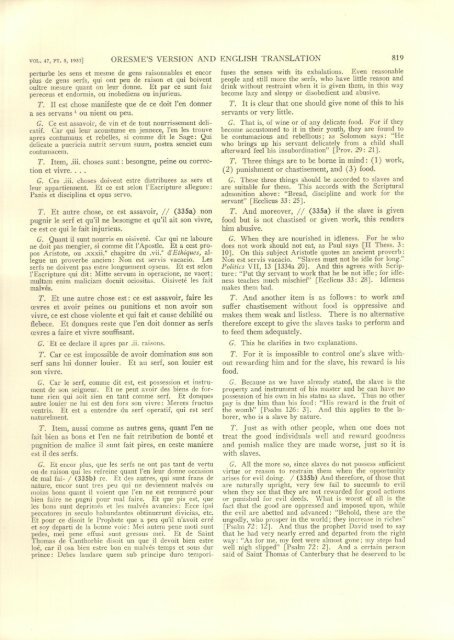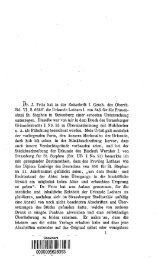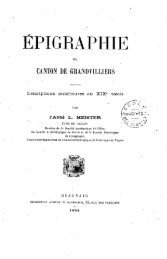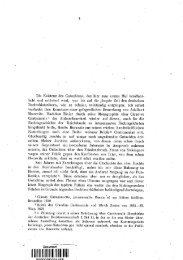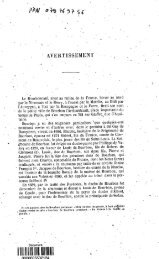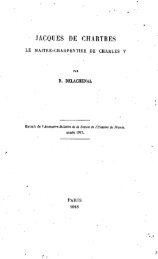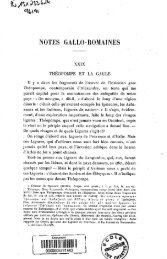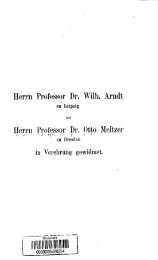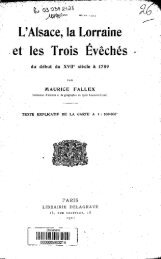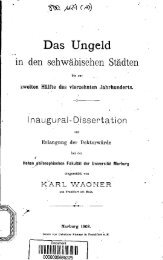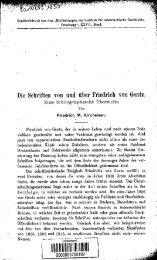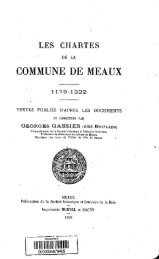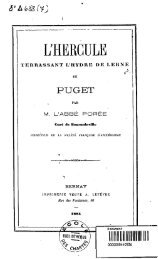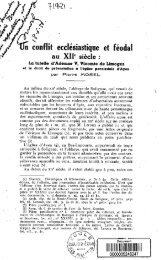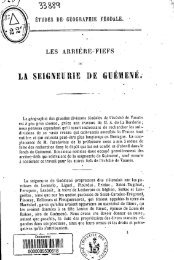4P Li gç(' TRANSACTIONS
4P Li gç(' TRANSACTIONS
4P Li gç(' TRANSACTIONS
Create successful ePaper yourself
Turn your PDF publications into a flip-book with our unique Google optimized e-Paper software.
VOL. 47, PT. 5, 19571 ORESME'S VERSION AND ENGLISH TRANSLATION 819<br />
perturbe les sens et mesme de gens raisoimables et encor<br />
plus de geiis serfs, gut ont peu de raison et gui boivent<br />
oultre mesure cluant on leur donne. Et par ce sunt faiz<br />
pereceus et endorinis, on inobediens on injurieus.<br />
T. 11 est chose manifeste que de cc doit l'en dormer<br />
a ses servans 1 ou nient on peu.<br />
G. Ce est assavoir, tie yin et de tout nourrissement delicatif.<br />
Car qui leur acoustunie en jennece, len les trouve<br />
apres contumaux et rcbclles, si comnie dit le Sage: Qui<br />
delicate a puericia nutrit servuni suurn, postea senciet eum<br />
contumacem.<br />
T. Item, .iii. clioses sunt: besongne, peine ou correction<br />
et vivre.<br />
G. Ces .iii. choses doivent estre distribuees as sers et<br />
leur appartieiineiit. Et ce est selon l'Escripture alleguec:<br />
Panis et disciplina et opus servo.<br />
T. Et autre chose, ce est assavoir, // (335a) non<br />
pugnir Ic serf et qu'il ne besongne et qu'il ait son vivre,<br />
cc est cc qui le fait injurieus.<br />
G. Quant il sunt nourris en oisiveté. Car gui ne labourc<br />
ne doit pas mengier, Si comme dit l'Apostle. Et a cest propos<br />
Aristote, ou .xxxii. chapitre du .vii. dEfhiqucs, allegue<br />
un proverbe ancien: Non est servis vacacio. Les<br />
serfs ne doivent pas estre longuenient oyseus. Et est selon<br />
l'Escripture qui dit: Mitte servum in operacione, ne vacet;<br />
multam enim maliciam docuit ociositas. Oisivetd les fait<br />
nialves.<br />
T. Et une atitre chose est: cc est assavoir, faire les<br />
cevres et avoir peines ou punitions et non avoir son<br />
vivre, ce est chose violente et qui fait et cause debilité ou<br />
flebece. lit donqucs reste que I'en doit donncr as serfs<br />
cevres a faire et vivre souffisant.<br />
G. lit ce declare it apres par .ii. raisons.<br />
7'. Car ce est impossible de avoir domination sus son<br />
serf sans ltd donner louier. Et an serf, son louier est<br />
son vivre.<br />
G. Car Ic serf, conime dit est, est possession et instrument<br />
de son seigneur. Et lie pent avoir des biens de fortune<br />
rico qui soit sien en tant comme serf, lit donques<br />
autre louier tie lui est deu fors son vivre: Merces fructus<br />
ventris. lit est a entendre du serf operatif, gui est serf<br />
naturelnient.<br />
T. Item, aussi comme as autres gens, quant l'en ne<br />
fait bicn as bons et l'en ne fait retribution tie bonté et<br />
pugnition tie malice it sunt fait pires, en ceste maniere<br />
cst ii des serfs.<br />
G. lit encor plus, que les serfs tie ont pas tant de vertu<br />
on de raison qui les refreine quant l'en leur donne occasion<br />
tie mal fai- / (335b) re. lit ties autres, gui sunt trans de<br />
nature, encor sunt tres pen gui lie deviennent nialves ou<br />
nioins bons quant it voient que len ne est rcinuneré pour<br />
hien faire tie pugni pour mal faire, lit que pis est, que<br />
les bons sunt depriiiiés et les nialvés avancies: Ecce ipsi<br />
peccatores in seculo habundantcs obtinuerunt divicias, etc.<br />
Et pour cc disoit Ic Prophete que a pen quil n'avoit erré<br />
et soy departi de la bonne voie : Mci autem pene moti soot<br />
pedes, mci pene effusi sunt gressus mci. Et tie Saint<br />
Thomas tie Canthorbic disoit Un que it devoit bien estre<br />
be, car il osa bieii estre bon en malvés temps et sous dur<br />
prince: Debes laudare queni sub principe duro tempori-<br />
fuses the senses with its exhalations. Even reasonable<br />
people and still more the serfs, who have little reason and<br />
drink without restraint when it is given them, in this way<br />
become lazy and sleepy or disobedient and abusive.<br />
T. It is clear that one should give none of this to his<br />
servants or very little.<br />
G. That is, of wine or of any delicate food. For if they<br />
become accustomed to it in their youth, they are found to<br />
be contumacious and rebellious; as Solomon says: "He<br />
who brings up his servant delicately from a child shall<br />
afterward feel his insubordination" j, Prov. 29: 21].<br />
T. Three things are to be borne in mind: (1) work,<br />
(2) punishment or chastisement, and (3) food.<br />
G. These three things should be accorded to slaves and<br />
are suitable for them. This accords with the Scriptural<br />
admonition above: "Bread, discipline and work for the<br />
servant" [Ecclicus 33: 25].<br />
T. And moreover, // (335a) if the slave is given<br />
food but is not chastised or given work, this renders<br />
him abusive.<br />
G. When they are nourished in idleness. For he who<br />
does not work should not eat, as Paul says [II Thess. 3:<br />
10]. Oti this subject Aristotle quotes an ancient proverb:<br />
Non est servis vacacio. "Slaves must not be idle for long."<br />
Politics 'VII, 13 [1334a 20]. And this agrees with Scripture:<br />
"Put thy servant to work that lie be not idle; for idleness<br />
teaches much mischief" [Ecclicus 33: 28]. Idleness<br />
makes them bad.<br />
T. And another item is as follows: to work and<br />
suffer chastisement without food is oppressive and<br />
makes them weak and listless. There is no alternative<br />
therefore except to give the slaves tasks to perform and<br />
to feed them adequately.<br />
G. This he clarifies in two explanations.<br />
T. For it is impossible to control one's slave without<br />
rewarding him and for the slave, his reward is his<br />
food.<br />
C. Because as we have already stated, the slave is the<br />
property and instrument of his master and he can have no<br />
possession of his own in his status as slave. Thus no other<br />
pay is due him than his food: "His reward is the fruit of<br />
the womb" [I'saliii 126: 3]. And this applies to the laborer,<br />
who is a slave by nature.<br />
T. Just as with other people, when one does not<br />
treat the good individuals well and reward goodness<br />
anti punish malice they are made worse, just so it is<br />
with slaves.<br />
C. All the more so, since slaves do not possess sufficient<br />
virtue or reason to restrain them when the opportunity<br />
arises for evil doing. / (335b) And therefore, of those that<br />
are naturally upright, very few fail to succumb to evil<br />
when they see that they are not rewarded for good actions<br />
or punished for evil deeds. What is worst of all is the<br />
fact that the good are oppressed and imposed upon, while<br />
the evil are abetted and advanced: "Behold, these are the<br />
ungodly, who prosper in the world; they increase in riches"<br />
[Psalm 72: 12]. And thus the prophet David used to say<br />
that he had very nearly erred and departed from the right<br />
way: "As for me, lily feet were almost gone; my steps had<br />
well nigh slipped" [Psalm 72: 2]. And a certain person<br />
said of Saint Thomas of Canterbury that lie deserved to be


